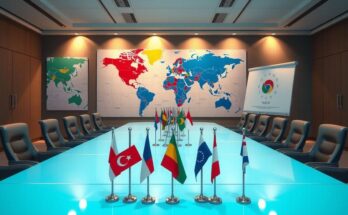The approaching 2027 elections in Nigeria are heavily influenced by money politics, with politicians prioritizing power struggles over democratic integrity. Former Governor Achike Udenwa highlights the pervasive issue of purchasing electoral victories. Urgent reforms, including establishing an electoral offenses commission and regulating campaign financing, are necessary to preserve the democratic process, supplemented by ongoing advocacy from civil society organizations.
With the 2027 general elections approaching in Nigeria, intense political discussions are taking place. President Bola Tinubu is fiercely vying for a second term, while various opposition figures strategize to unify against him. Despite this political fervor, the integrity of democracy appears to be compromised, as substantial attention is directed towards power struggles rather than the preservation of democratic principles.
Former Imo State Governor Achike Udenwa has recently expressed concern about the detrimental effects of money politics on Nigeria’s electoral integrity. During an appearance on the ‘State Affairs’ podcast, he stated that candidates with substantial financial resources could effectively buy electoral success. He lamented, “Unfortunately, our society has grown to such a level where if you say vote for me, I am no longer asking what you can do. If I don’t vote for you, you can buy your way through if you have the right amount of money.”
Udenwa’s experiences over his eight years in office have left him disillusioned with the rampant corruption within Nigerian politics. Money politics appears to be the primary obstacle to cultivating a robust democratic culture. Reports have surfaced detailing incidents where voters received financial incentives before elections as a form of coercion.
The mechanism known as ‘see and buy’ has been employed, wherein voters showcase completed ballots in exchange for cash and other rewards, thereby undermining democratic processes and fostering mediocrity within political leadership. Furthermore, some judicial officials have been implicated in unethical conduct regarding party primaries, aggravating the situation further.
Mahmood Yakubu, Chairman of the Independent National Electoral Commission (INEC), has urged action against the bribing of delegates during primaries, emphasizing that significant sums, often in foreign currencies, have been involved. Adding to this issue is the escalating cost of nomination forms for political aspirants, which has surged dramatically since the re-establishment of democracy in 1999.
Dataphyte estimates that costs for presidential nomination forms in major parties increased by 300 percent from 2015 to 2023. While the Electoral Act of 2022 imposes expenditure limits on candidates, these limits seem largely ineffective against the backdrop of actual campaign financing.
Nevertheless, there have been some commendable efforts in prosecuting and convicting election officials and INEC staff who have compromised electoral integrity. However, these prosecutions are minimal compared to the widespread occurrences of electoral malpractice. A report from the Commonwealth Observer Group following the 2023 Presidential and National Assembly Elections indicated that reforms have not sufficiently addressed persistent concerns.
To combat money politics, Nigeria could consider adopting practices similar to those established in the United States, which impose contribution limits and encourage party funding through membership dues. The establishment of an electoral offenses commission by the National Assembly is critical for improving oversight on campaign financing. Civil society organizations must also continue advocating for meaningful electoral reforms.
In conclusion, the influence of money politics poses a significant threat to the democratic process in Nigeria as the 2027 elections approach. The alarming trend of candidates purchasing victories undermines electoral integrity and compromises governance quality. Urgent reforms are needed, including the establishment of an electoral offenses commission and stricter regulations on campaign financing, to protect the foundation of democracy. Civil society must also remain vigilant in advocating for consistent electoral reforms to ensure a credible electoral process.
Original Source: punchng.com




